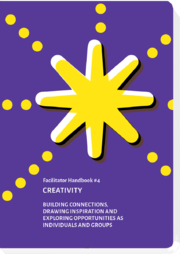Goal
- Learners will create an overview of different options regarding a problem.
- Learners will create a mutually supportive exchange, offer different perspectives, and learn to apply mindful communication.
Steps
One person steps in front of the group, turning his or her back to the group and asking one question for which he or she wants to find a solution. Make clear that it can only be one, open question, and make sure that all group members understand the question.
Next, the group is invited to answer the question according to the following rules:
- focus on a concrete answer with no value judgement, even implicitly, of the question;
- participants should proceed one after the other (to make sure the questioner is able to follow);
- The facilitator moderates the process.
Like the group, the questioner also has to follow some rules:
- be thankful (it doesn’t matter if you find the inspiration useful in the moment or not – your colleagues are trying to support you);
- don’t reply or comment (at the end it is up to you what you wish to take from the process, and what not);
- document the ideas for later.
After each person has given their suggestions, the facilitator asks the questioner to return to the group . At this point, a new round can start.
Reference
This approach is inspired by the popular German concept of collegial counseling (Kollegiale Beratung).
Experiences
This task is very helpful for finding solutions for real challenges, e.g. in a project team. Often the questioners are pleasantly surprised by the broad range of solutions offered, and even the unrealistic ones can be decisive as they help the questioner to think outside the box.
This task combines efficiency and goal orientation with practicing communication skills in a group. The questioner learns to listen and not to defend or evaluate. For their part, participants giving the suggestions, learn to concentrate on what could be relevant and to empathize with their colleague.
This task also helps participants overcome any insecurities they may have about presenting their imperfections publicly, an attitude that builds the trust required for learning from peers.




